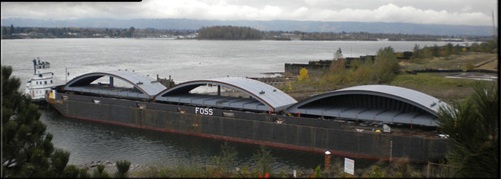forum
library
tutorial
contact

WSU to Study Columbia, Snake River Closures
by Shannon Dininny, Associated PressSeattle Post-Intelligencer, December 2, 2010
|
the film forum library tutorial contact |

|
WSU to Study Columbia, Snake River Closures
by Shannon Dininny, Associated PressSeattle Post-Intelligencer, December 2, 2010 |
 YAKIMA, Wash. -- Washington State University plans to study the impact of closing navigation locks on the Columbia and Snake rivers this winter.
YAKIMA, Wash. -- Washington State University plans to study the impact of closing navigation locks on the Columbia and Snake rivers this winter.
Ken Casavant, a professor of economics and director of WSU's Freight, Policy and Transportation Institute, said the locks previously have been closed for only a few weeks at a time, so any effect on shippers is not known.
The Army Corps of Engineers is replacing gates at The Dalles and John Day dams on the Columbia River and at the Lower Monumental dam on the lower Snake River. The rivers will be closed to barge traffic for at least three months, from Dec. 10 to March 18.
The locks are usually closed for about two or three weeks annually for routine maintenance - a short enough time that shippers and planners can work around it.
There's been no other instance of major maintenance for such a long period, Casavant said.
"Once you shut down one dam, everything stops," he said. "Our expectations - our hypotheses - are that it will have an impact on the Northwest."
More than 8 million tons of cargo, valued at as much as $2 billion dollars, move by barge each year on the waterway, according to Glenn Vanselow, executive director of the Pacific Northwest Waterways Association.
Northwest agricultural commodities, such as wheat and potatoes, move downriver for export at West Coast ports, while petroleum products, fertilizers and pesticides move upriver to farm communities.
About 40 percent of the region's wheat exports travel by barge on the Columbia and Snake rivers.
Vanselow said his group supports WSU's study efforts to better understand the impact river closure has on the region.
He said efforts have been made over the past year to educate the wheat industry about the river closure and prepare for it. Some growers and shippers sold early and exported more wheat before the closure; those that didn't likely face higher transportation costs to ship by rail or truck, or storage costs to hold their wheat until spring when the river reopens.
The new gates will extend the life of the navigation locks by 50 years, Vanselow said.
"While there will be a disruption and there will be some hardships in the short term, we are very much supportive of the closure and the repairs that are going to be made," he said. "This is an important investment in the long-term reliability of the river system."
Shipping by rail or truck are both more expensive than barge, Casavant said. International buyers of agricultural commodities also could see higher prices to recoup the higher shipping costs, he said.
Casavant also said information gathered in the study could be useful for other major shipping routes, such as the Mississippi or Missouri rivers, because they face the same disruptions to their transportation system in the future.
Related Pages:
Impact of Transportation Alternatives to be Studied by Matt Haugen, WSU Today, 12/1/10
learn more on topics covered in the film
see the video
read the script
learn the songs
discussion forum
